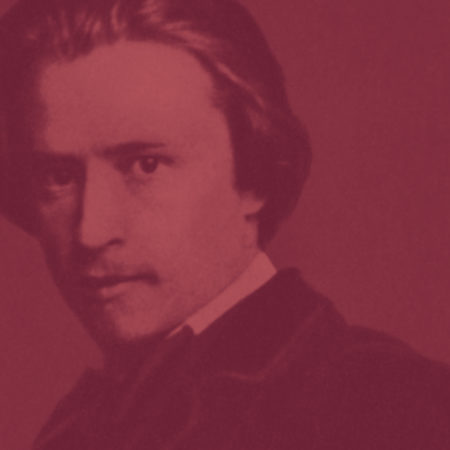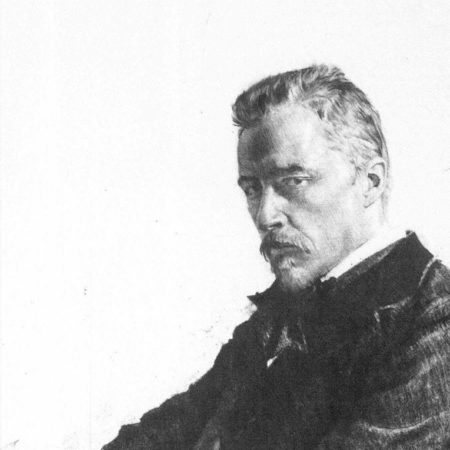An Essay by Susan Youens
Courtesy of the Internationale Hugo-Wolf-Akademie
The Lieder of Hugo Wolf (1860-1903): Programm VIII
“Wohin mit der Freud?”
Essay by Susan Youens
“Wohin mit der Freud?”
(“Wohin mit der Freud?” song list)
Hugo Wolf wrote more comic songs than any other significant song composer in the nineteenth and early twentieth centuries, and he refashioned the genre for what Carl Schorske calls “the age of Psychological Man (or Woman).” Understanding that comedy acts to channel resentment, rage, and hostility through the psychic discharge of laughter, he created songs filled with emphatic details expressed by emphatic personae. Like Wolf himself, whose opinions were never tepid, his alter egos in song—male and female—taunt, upbraid, lambast, and mock those who displease them. Wolf was, first, audience for the poet’s joke when he read the poems and then a companion-jester with the poet when he set their words to music, passing on the joke to audience. A post-Wagnerian tonal language is here bent to the depiction of human nature, warts and all, by a composer who loved Rabelaisian comic extravagance.
We begin, appropriately, with a Wolf-Mörike song. Not only was the great poet Eduard Mörike the catalyst for Wolf’s astonishing outburst of song in his mature style in 1888—the third “miracle year” of German song (Schubert in 1815 and Schumann in 1840 were the others)—but he wrote in almost every genre and style, from pseudo-folk poems to ballads, lyrics of piercing intensity, and diffferent varieties of wit and humor. Selbstgeständnis is a wry bit of psychological insight in which a spoiled only child, now an adult, reflects on the doting mother’s love he received and the beatings he didn’t—but the latter might have improved his character. A merry, suitably self-satisfied exercise in pseudo-folksong is tempered by Wagnerian chromaticism; one notices in particular the rising chromatic bass line in the piano’s interlude midway.
Nearly one-third of the songs in Wolf’s Italienisches Liederbuch are in a woman’s voice, and she is often not pleased with her effeminate, supine, unfaithful, short, conceited, or otherwise condemnable lover—sometimes, a bad musician to boot. In Mein Liebster hat zu Tische mich geladen, we hear of a dinner invitation that went massively awry, with its broken cookpot, no drinking glasses, rock-hard bread, a blunt knife, and no house. Was this an al fresco ordeal? Each unpleasant element induces an abrupt change of tonal location, and with each shift, the woman grows angrier. By the end, she is too furious for closure, so it is left to the piano to vary her “hacking at stony bread” motif and then end it all with a good, swift kick. Gluttony, featuring mammoth amounts of bread and a sausage or two (this from a sausage-loving composer), masquerades as love-induced starvation in Ich liess mir sagen, in which we hear a specimen of Wolf’s most sophisticated, and pointed, tonal wit. The piano groans dolorously at the outset, with low, ominous trills; slithering chromatic figures interspersed with dramatic leaps downward; and tonal restlessness. Not until the mock-triumphal announcement of seven loaves for each back tooth do we hear a very momentary announcement of F minor. A shorter resumption of the nauseated heaving alternates with more food-borne dotted rhythms, leading to a massive climax on the word “Hungersnoth,” a melodramatic shriek featuring bone-piercing dissonance. The loud C minor chord at the end sounds like a giant “HA!!!”
In Ich esse nun mein Brot nicht trocken mehr, we seem to hear a full-grown and passionate woman lamenting the fact that she does not have a lover. Wolf therefore accords her the dark, “grown-up” key of E-flat minor; descending whole-tone and semitone figures evocative of flowing tears; dotted rhythmic patterns that mimic Scotch-snap rhythms, as if she is stumbling through tears; and a twisting, turning vocal line whose changes of direction imitate the way the persona looks to the left and the right, in vain. The ultra-chromatic hand-writing is such that the listener is all the more amused when the singer turns out to be around twelve or thirteen years old, near the age of the fourteen-year old “elderly little man” for whom she longs. Here, Wolf shifts to major mode and staccato jollity: adult posturing = Wagnerian motivic development, while childish satisfaction = blue skies, tonally speaking.
The Italienisches Liederbuch features a certain number of priest- and Pope-jokes, among them Geselle, woll’n wir uns Kutten hüllen, in which a ne-er-do-well hatches a plan for him and his companion to don monk’s robes. They will beg from door to door (the near-incessant “knocking figure” tells us how persistent these rascals will be), taking advantage of any and all opportunities for seducing maidens. Wolf ensures that we hear the threats to the general populace in the seemingly merry rapscallion scheming.
In Mein Liebster ist so klein (and here, we remember that Wolf was short of stature and slight of build), a woman heaps invective on a lover so tiny that insects knock him over. Impugning his manhood, she describes him as picking jasmine and sweeping the floor with his curls, but if she curses him in picturesque terms, she also curses those like her who must stoop so low for a kiss. Whatever his diminutive size, she loves him. Wolf spins a variation on the motive we hear in the piano throughout Schubert’s Goethe song “Geheimes” in which love is similarly cloaked in secrecy (“Geheimes”) or exasperation (this song) and yet assured. Not since Haydn’s Die Schöpfung has a composer so relished the musical depiction of the insect world. And we can imagine Nun lass uns Frieden schliessen as the reconciliation after a blistering quarrel between lovers. If it is part of the comedy of love that such pleas for forgiveness and love restored must happen, this entreaty is too sweet to resist, with its lulling motion, pastoral open fifths in the left hand, and crucial words (lang, du, könnten, Könige, Verliebten, Herzen) sustained over the barline by the singer.
…. The great Romantic poet Joseph von Eichendorff’s role poems—thumbnail sketches of fictive characters who represent a type or archetype in society—were less often set to music than his night- and wanderer-poems. While Wolf did great things with the latter vein (“Nachtzauber,” “Verschwiegene Liebe”), he could and did feel that this corner of a great poet’s oeuvre was his to discover for music. One of those Rollenlieder is Lieber alles, with its (very) young man perplexed as to a choice of occupation or profession. Rejecting a soldier’s life for its dangers, a student’s life as too difficult, and poetry, for all its attraction, is too dainty for “wild times” such as these, he adopts the attributes of each (sword, lute) as he envisions his outlaw energies unleashed on the world. If Eichendorff thus mocks his own calling, the underlying question is deeply serious: “What use poetry in postrevolutionary upheaval?”Another Rollenlied is Der Scholar, a largely affectionate portrayal of a wandering student. Scholars in their youth are prone to pomposity, as when this young man proclaims that he will stroll in the fields of knowledge, “uncorrupted by Mammon,” will think seriously and, from time to time, savor a mouthful of wine. The pictorial details are delightful: the moto perpetuo walking/strolling motion in the left hand, the “Feld der Wissenschaft” made emphatic by large intervallic gestures inching upwards by semitones, and the darling treble serenade-to-the-sweetheart with which the song ends. Wolf loved serenades.
In Der Schäfer, Goethe spins a comic variation on the antique pastoral tradition by which shepherds and shepherdesses disport themselves in idealized rural landscapes: Theocritus and sVirgil did much to establish its conventions. The poem hinges on the rhymes “Schäfer-Schläfer/Schaf-Schlaf” (shepherd-sleeper, sheep-sleep), with its lazy shepherd who falls in love and cannot eat or sleep. When his beloved accepts the poor booby, all his bodily appetites return in full force; Goethe thus underscores the unalterability of the human animal. Wolf has a lovely time making his music yawn and dawdle in multiple ways.
With his love of the exaggerated-comical, Wolf would naturally be drawn to Shakespeare’s Bottom in A Midsummer Night’s Dream for his Lied des transferierten Zettel: a weaver transformed into an ass by the sprite Puck and thereafter the butt of the play’s biggest joke. The piano introduction of the foreshadows the grotesque donkey sound-effects to come even before Bottom makes his entrance and tries to sing a charming ditty about various birds in order to woo his Titania, but he cannot help himself: octave-displaced tritone braying interrupts midway and then ends the song.
The Swiss writer Gottfried Keller created feisty village maidens perfectly capable of keeping the men they choose in line by sheer fiery spirit, as in Singt mein Schatz. This young woman has a competitive streak, and Wolf accordingly outdoes the man’s imagined chirping finch with the woman’s mellifluous nightingale. The near-omnipresent descending chromaticism hints at quasi-Wagnerian passion and, perhaps, ill-consequences for the beloved, should he not match her flaming love.
Returning to the Italian Songbook, a serenading lover adopts a novel approach to persuade his sweetheart in Nicht länger kann ich singen: it is too windy, time is passing, and he shouldn’t have to walk home alone. Wolf has fun with stylized (tritone!) gusts of wind and sinking into lower realms of sleep (or not), but he also imbues the half-comic lament in A minor with a certain wistfulness. This 41st song is followed immediately by Schweig’ einmal still, in which we hear an inept and unwelcome serenader—the luckless fellow in the preceding song?—through the ears of his displeased recipient. The piano introduction seems to mimic a donkey’s braying, his awkward leaping-about then parodied by the singer; he is certainly trying his best/worst, with trills and grace-notes that are not graceful. He even quotes (loudly) the beginning of Beethoven’s “Für Elise”—but this maiden isn’t having it.
In Zur Warnung, both Mörike and Wolf mock what for them was a matter of utmost importance: the relationship between poet/composer and his Muse. Both men knew frustrating periods of creative block, and both knew the sense of release when the arid spells ended. Here, a hungover poet orders his Muse to give him a poem; she wickedly responds with floods of nonsense until the poet banishes her with the hair of the dog that bit him. As always with Wolf, the jest is made musical: the hangover is “modern music,” and the “schnöde Bafel” is Beethoven-made-stupid (the beginning of the Ninth Symphony turned into a nonsense jig-tune, wth Brahms’s Beethovenian inspiration the target). Behind the hilarity is recognition of creativity’s untamed, unknowable being.
Because Wolf followed after Schubert and Schumann, he was on the lookout both for Goethe texts neither of his predecessors had chosen or for instances where he felt he could improve on their prior settings. Ritter Kurts Brautfahrt is an example of the former, a comic ballad about a knight en route to noble nuptials. But he is held up by a combative opponent; a former sweetheart with their child who tempts him mightily (but he goes on); and, finally, money-lenders who clap him in jail for his debts. No life is sufficiently privileged to escape troubles from enemies, women, and financial chicanery, Goethe wryly concludes. Wolf builds his narrative over various figures indicative of 1) empty pomp and circumstance (dotted rhythms galore), 2) chromatic drum-rolls to tell of menace and fighting, and 3) a thunderous crescendo and climax in the piano postlude, as if to recapitulate the entire exercise in frustration.
Rustic human beings and supernatural creatures coexist in the comic ballad Storchenbotschaft, in which a shepherd must read aright the meaning of the two storks who appear at his door. Beyond myths of storks bringing babies, this is also a myth of poetic creation: when the human poet “gives birth” to the correct message (twins!), the birds fly away, and an embarrassment of riches is his reward. Wolf loved the works of the Balladenmeister Carl Loewe (1796-1769); if he incorporates multiple reminiscences of Loewe in this delightful ballad, he also transforms the earlier composer’s greater naiveté into sophistication for a “nach-Wagner’schen” age.
Mörike too wrote a Rollenlied of sorts in Rath einer Alten, in which one can almost see an elderly village woman instructing a young maiden how to make marriage work (clean linen, cheerful hard work, knowing how to be silent, respect for one’s man, etc.). We hear an old woman’s raspy voice in the piano’s near-incessant grace notes; if she lays down the law in minor mode at beginning and end, she warms to major mode when speaking directly to the girl.
Wolf was largely an autodidact who taught himself to compose in part by imitating Schumann. Drawn to Schumann’s poets, it is only to be expected that he would turn to the poetry of the artist-poet and Schumann-friend Robert Reinick, whose Liederbuch eines Malers (1837) is one of the prettiest of all lieder sources. If his verse is not profound à la Goethe or Mörike, it is truly charming stuff. In Liebchen, wo bist du, a distraught sorceror-in-love searches for his equally magic beloved, who appears, disappears, and transforms at will. The rhythmic and chromatic jostling, the offbeat accents, the syncopations of the introduction tell us of comic emotional turmoil before a word is sung. Eichendorff’s Die Kleine is in a similar folkloric vein, with its young girl confiding to her mother how eager she is to find a husband and “kiss” him all night long. Sections in E major for the girl’s desires frame a central section in G major of canny psychological warfare: “You can kiss my father whenever you wish, but I lie in bed alone.” Returning to Reinick, the singer of Wohin mit der Freud’ wants to embrace the clear, blue sky and the lovely world, but they are too far away; his sweetheart, however, is right there. Now he knows what joy is for. The duet between the piano’s right-hand part and the singer, the frequent second-beat emphases in triple meter to create irresistible dance-like lilt, the turns to the flat side for distance and separation are just a few of the lovely details in this outstanding early song.
What artist doesn’t dream of kicking a critic down the stairs? In Abschied, prolonged chromatic instability (perhaps a sign of the critic’s shiftiness) leads to sudden surety on the word “Gewiss!”, as the poet acknowledges the “Weltsnase” in the middle of his face–a displaced phallic symbol? Mockery of Jews? (The indication “judelnd” indicates nasal singing supposedly evocative of Jews.) Variations on “lamentation” semitones then turn into a noisy fall down the stairs, aided by the tiniest kick from the poet. The rambunctious, gleeful waltz in B-flat for the piano at the end is just what one might expect in Vienna, which buried its waltz-kings in the same Grove of Honor with Beethoven, Schubert—and Wolf.
* * *
From affectionate laughing with a poetic character to grotesquerie deployed at a character’s expense, Wolf delves into an array of comedic styles. Always, the mockery is fashioned to tell us about fin-de-siècle music—his “present day”—and the dilemmas of late-Romantic composers.
The Author

In Cooperation with
The Lieder of Hugo Wolf (1860-1903): Programm VIII
“Wohin mit der Freud?”
(Susan Youens on “Wohin mit der Freud?”)
Ich esse nun mein Brot nicht trocken mehr – Italian rispetto, “Non posso più mangiarlo il pane asciutto,” trans. Paul Heyse (1830-1914), Italienisches Liederbuch (1896), 25 March 1896
Selbstgeständnis – text by Eduard Mörike (1804-1875) in Gedichte von Eduard Mörike (1889), 17 March 1888
Mein Liebster hat zu Tische – Italian vilota, “El mio moroso m’a invidato a cena,” trans. Paul Heyse, Italienisches Liederbuch (1896), 26 March 1896
Ich ließ mir sagen – Italian vilota, “Me xe stà dito,” trans. Paul Heyse, Italienisches Liederbuch, 28 March 1896
Geselle, woll’n wir uns in Kutten hüllen – Italian folk vilota, “Compagno mio, vustu che andèmo frate,” trans. Paul Heyse, Italienisches Liederbuch, 5 December 1891
Nein, junger Herr – rispetto, “Giovinottino, non si fa così,” trans. Paul Heyse, Italienisches Liederbuch, 9 December 1891
Mein Liebster ist so klein – Italian folk rispetto “E lo mio damo è tanto piccolino,” trans. Paul Heyse, Italienisches Liederbuch, 3 December 1891
Nun lass uns Frieden schließen – Italian rispetto, “Facciam la pace, caro bene mio,” trans. Paul Heyse, Italienisches Liederbuch, 14 November 1890
Lieber alles – text by Joseph Freiherr von Eichendorff (1788-1857), Gedichte von Eichendorff (1889), 29 September 1888
Der Scholar – text by Joseph Freiherr von Eichendorff, Gedichte von Eichendorff, 22 September 1888
Der Schäfer – text by Johann Wolfgang von Goethe (1749-1832), Gedichte von Goethe (1890), 4 November 1888
Lied des transferierten Zettel – “The ousel cock, so black of hue,” from Act 3, Scene 1 of William Shakespeare (1564-1616), A Midsummer Night’s Dream, translated by August Wilhelm Schlegel (1767-1845), in Vier Gedichte nach Heine, Shakespeare, und Lord Byron (1897), 11 May 1889
Singt mein Schatz wie ein Fink – text by Gottfried Keller (1819-1890), Alte Weisen. Sechs Gedichte von Keller (1891), 2 June 1890
Nicht länger kann ich singen – Italian rispetto, “Non posso più cantar, che tira vento,” trans. Paul Heyse, Italienisches Liederbuch, 23 April 1896
Schweig’ einmal still – Italian rispetto, “Stattene zitta brutta cicalina,” trans. Paul Heyse, Italienisches Liederbuch, 23 April 1896
Zur Warnung – text by Eduard Mörike, Gedichte von Mörike, 25 February 1888
Ritter Kurts Brautfahrt – text by Johann Wolfgang von Goethe, Gedichte von Goethe, 9 December 1888
Storchenbotschaft – text by Eduard Mörike, Gedichte von Mörike, 27 March 1888
Rat einer Alten – text by Eduard Mörike, Gedichte von Mörike, 22 March 1888
Liebchen, wo bist Du? – text by Robert Reinick (1805-1852), 12 April 1882
Die Kleine – text by Joseph Freiherr von Eichendorff, 8 March 1887
Wohin mit der Freud’? – text by Robert Reinick, 31 December 1882
Abschied – text by Eduard Mörike, Gedichte von Mörike, 8 March 1888



